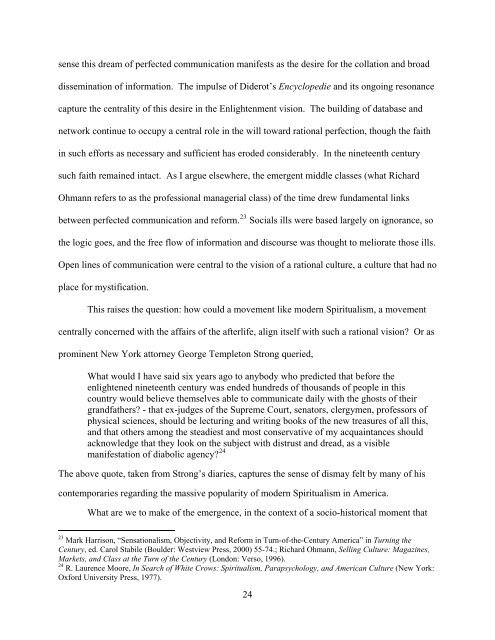A Genealogy of the Extraterrestrial in American Culture
A Genealogy of the Extraterrestrial in American Culture
A Genealogy of the Extraterrestrial in American Culture
You also want an ePaper? Increase the reach of your titles
YUMPU automatically turns print PDFs into web optimized ePapers that Google loves.
sense this dream <strong>of</strong> perfected communication manifests as <strong>the</strong> desire for <strong>the</strong> collation and broad<br />
dissem<strong>in</strong>ation <strong>of</strong> <strong>in</strong>formation. The impulse <strong>of</strong> Diderot’s Encyclopedie and its ongo<strong>in</strong>g resonance<br />
capture <strong>the</strong> centrality <strong>of</strong> this desire <strong>in</strong> <strong>the</strong> Enlightenment vision. The build<strong>in</strong>g <strong>of</strong> database and<br />
network cont<strong>in</strong>ue to occupy a central role <strong>in</strong> <strong>the</strong> will toward rational perfection, though <strong>the</strong> faith<br />
<strong>in</strong> such efforts as necessary and sufficient has eroded considerably. In <strong>the</strong> n<strong>in</strong>eteenth century<br />
such faith rema<strong>in</strong>ed <strong>in</strong>tact. As I argue elsewhere, <strong>the</strong> emergent middle classes (what Richard<br />
Ohmann refers to as <strong>the</strong> pr<strong>of</strong>essional managerial class) <strong>of</strong> <strong>the</strong> time drew fundamental l<strong>in</strong>ks<br />
between perfected communication and reform. 23 Socials ills were based largely on ignorance, so<br />
<strong>the</strong> logic goes, and <strong>the</strong> free flow <strong>of</strong> <strong>in</strong>formation and discourse was thought to meliorate those ills.<br />
Open l<strong>in</strong>es <strong>of</strong> communication were central to <strong>the</strong> vision <strong>of</strong> a rational culture, a culture that had no<br />
place for mystification.<br />
This raises <strong>the</strong> question: how could a movement like modern Spiritualism, a movement<br />
centrally concerned with <strong>the</strong> affairs <strong>of</strong> <strong>the</strong> afterlife, align itself with such a rational vision? Or as<br />
prom<strong>in</strong>ent New York attorney George Templeton Strong queried,<br />
What would I have said six years ago to anybody who predicted that before <strong>the</strong><br />
enlightened n<strong>in</strong>eteenth century was ended hundreds <strong>of</strong> thousands <strong>of</strong> people <strong>in</strong> this<br />
country would believe <strong>the</strong>mselves able to communicate daily with <strong>the</strong> ghosts <strong>of</strong> <strong>the</strong>ir<br />
grandfa<strong>the</strong>rs? - that ex-judges <strong>of</strong> <strong>the</strong> Supreme Court, senators, clergymen, pr<strong>of</strong>essors <strong>of</strong><br />
physical sciences, should be lectur<strong>in</strong>g and writ<strong>in</strong>g books <strong>of</strong> <strong>the</strong> new treasures <strong>of</strong> all this,<br />
and that o<strong>the</strong>rs among <strong>the</strong> steadiest and most conservative <strong>of</strong> my acqua<strong>in</strong>tances should<br />
acknowledge that <strong>the</strong>y look on <strong>the</strong> subject with distrust and dread, as a visible<br />
manifestation <strong>of</strong> diabolic agency? 24<br />
The above quote, taken from Strong’s diaries, captures <strong>the</strong> sense <strong>of</strong> dismay felt by many <strong>of</strong> his<br />
contemporaries regard<strong>in</strong>g <strong>the</strong> massive popularity <strong>of</strong> modern Spiritualism <strong>in</strong> America.<br />
What are we to make <strong>of</strong> <strong>the</strong> emergence, <strong>in</strong> <strong>the</strong> context <strong>of</strong> a socio-historical moment that<br />
23 Mark Harrison, “Sensationalism, Objectivity, and Reform <strong>in</strong> Turn-<strong>of</strong>-<strong>the</strong>-Century America” <strong>in</strong> Turn<strong>in</strong>g <strong>the</strong><br />
Century, ed. Carol Stabile (Boulder: Westview Press, 2000) 55-74.; Richard Ohmann, Sell<strong>in</strong>g <strong>Culture</strong>: Magaz<strong>in</strong>es,<br />
Markets, and Class at <strong>the</strong> Turn <strong>of</strong> <strong>the</strong> Century (London: Verso, 1996).<br />
24 R. Laurence Moore, In Search <strong>of</strong> White Crows: Spiritualism, Parapsychology, and <strong>American</strong> <strong>Culture</strong> (New York:<br />
Oxford University Press, 1977).<br />
24















